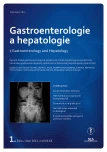What should be done in patients with inflammatory bowel diseases those lose a response to biological therapy?
Authors:
M. Lukáš
Authors‘ workplace:
Klinické a výzkumné centrum pro střevní záněty, ISCARE Lighthouse a 1. LF UK, Praha Ústav klinické biochemie a laboratorní diagnostiky 1. LF UK, Praha
Published in:
Gastroent Hepatol 2011; 65(1): 36-39
Category:
IBD: Review Article
Overview
Biological therapy became an important component of conservative therapy for patients with moderate or severe inflammatory bowel disease (IBD) at the beginning of this century. Primary failure in biological therapy is relatively rare and was described in clinical practice for 10% of IBD patients. From the clinical point of view, secondary failure is more frequent and occurs in 15–20% of patients during one year of therapy. Crucial questions which should be addressed prior to the intensification or withdrawal of biological therapy include confirmation of the presence of an inflammation, IBD complications and, primarily, opportunistic infections. Intensification of biological therapy is effective in 2/3 of IBD patients, who enjoy long-term benefits following such treatment. It is significant that half of patients are subsequently able to return to their original therapeutic strategy.
Klíčová slova:
inflammatory bowel diseases – Crohn’s disease – ulcerative colitis – biological therapy – infliximab – adalimumab
Sources
1. Peyrin–Biroulet L, Deltenre P, de Suray N et al. Efficacy and Safety of Tumor Necrosis Factor Antagonists in Crohn’s Disease: Meta-Analysis of Placebo-Controlled Trials. Clin Gastroenterol Hepatol 2008; 6(6): 644–653.
2. Rutgeerts P, Sanborn WJ, Feagan BG et al. Infliximab for induction and maintenance therapy for ulcerative colitis. N Engl J Med 2005; 353 : 2462–2476.
3. Gies N, Kroeker KI, Wong K et al. Treatment of ulcerative colitis with adalimumab or infliximab: long-term follow-up of a single-centre kohort. Alimentary Pharmacology Therapeutics 2010; 32(4): 522–528.
4. Bultman E, Kuipers EJ, van der Woude CJ. Systematic review: steroid withdrawal in anti-TNF-treated patients with inflammatory bowel disease. Aliment Pharmacol Ther 2010; 32(3): 313–323.
5. Colombel JF, Sandborn WJ, Reinisch W et al. Inflximab, azathioprine, or combination therapy for Crohn‘s disease. N Engl J Med 2010; 362(15): 1383–1395.
6. Lukáš M, Bortlík M. Infliximab a nebo azathioprin u nemocných s Crohnovou chorobou. Komentovaný referát ke studii SONIC. Remedia 2009; 19 : 381–384.
7. Schnitzler F, Fidder H, Ferrante M et al. Long-term outcome of treatment with infliximab: results from a single-centre kohort in 614 patients with Crohn‘s disease. Gut 2009; 58(4): 492–500
Labels
Paediatric gastroenterology Gastroenterology and hepatology SurgeryArticle was published in
Gastroenterology and Hepatology

2011 Issue 1
- Possibilities of Using Metamizole in the Treatment of Acute Primary Headaches
- Metamizole vs. Tramadol in Postoperative Analgesia
- Metamizole at a Glance and in Practice – Effective Non-Opioid Analgesic for All Ages
- Spasmolytic Effect of Metamizole
- The Importance of Limosilactobacillus reuteri in Administration to Diabetics with Gingivitis
-
All articles in this issue
- Editor-in-chief´s lead article
- No country for young men
- Dynamic scintigraphy of the oesophagus in the diagnostics of gastro-oesophageal reflux disease
- Autoimmune form of chronic pancreatitis and IgG4 positive mastitis
- Cytomegaloviral colitis in organ transplant recipients
- Successful use of OTSC® (Over-The-Scope Clip) in the treatment of iatrogenic colon perforation
- Is it possible to reintroduce original biological therapy in a relapsed Crohn’s disease patient?
- What should be done in patients with inflammatory bowel diseases those lose a response to biological therapy?
- Not only NOTES in Barcelona
- Acute mesenteric ischemia
- Gastroenterology and Hepatology
- Journal archive
- Current issue
- About the journal
Most read in this issue
- Cytomegaloviral colitis in organ transplant recipients
- Is it possible to reintroduce original biological therapy in a relapsed Crohn’s disease patient?
- Acute mesenteric ischemia
- Autoimmune form of chronic pancreatitis and IgG4 positive mastitis
